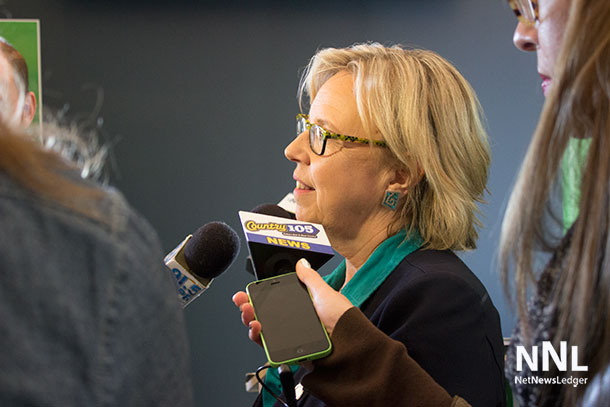“We need a National Transportation Strategy” – Elizabeth May
Thunder Bay – BUSINESS – The pandemic is taking a toll on the transportation sector. Across the country, with stay-at-home orders, and travel down, airlines, buses, and train travel is down significantly.
The industry is looking for ways to survive the pandemic. Green Party Parliamentary Leader Elizabeth May says it is a “Transportation Crisis”.
Overall, governments has been slow to fully support the transportation sector, which in many cases has been deemed an essential service by government.
There have been supports, but with the large capital expenses, high fuel costs and increased insurance costs, it is uncertain what the long-term impact of COVID-19 will be on the transportation sector.
With passenger numbers down significantly many bus operators have found even keeping employees on with the federal wage subsidy is not possible.
Federal Green Party Steps Up
In the House of Commons, Elizabeth May with the Green Party raised the issue during Question Period.
“The situation right now for the commercial bus lines, the coach bus sector, such as Wilson’s Transportation here on Vancouver Island or Maritime Bus in the maritime communities, is that this entire part of our transportation infrastructure is imminently at risk of going under. This is an integral part of our tourism sector, and it is integral in reducing greenhouse gases and serving remote first nations”.
May asked, “We have to have one of two things, either money has to be provided to the sector or the big banks have to back off. What can be done?”
Minister of Transport Omar Alghabra responded to May stating, “The inner-city passenger bus service industry has been hit very hard by the pandemic. Our government has provided a lot of financial support for businesses that have been impacted by COVID. The member knows that the inner-city bus service is regulated by the province. I also acknowledge that it is important to our cities and provinces, therefore, we will continue to monitor the situation. I am happy to work with the member on ideas we can work together on”.
The bus industry is looking for a more level playing field, where like aviation and rail, there is more direct federal oversight – pulling the industry back to a more national focus.
The pandemic is threatening the industry to the breaking point in many cases.
In British Columbia, Wilson’s Bus has seen four of the company’s buses valued at $600k each repossessed. Low passenger numbers have driven the company close to the brink.
Wilson’s Bus owner John Wilson says it is at “a crisis point”.
Post Pandemic Canada will Need the Bus Industry
As many politicians have said, there is light at the end of the tunnel as the COVID-19 vaccine is starting to be distributed. Moving forward toward a more normal world, across the country the charter bus industry is a vital link for tourism in Canada.
Right now it is hard to see if there will be a charter bus industry standing after the pandemic.
Marc Laplante, the Chairman of Ontario’s Motor Coach Association in in communication with the Ontario Government on this issue.
Ontario is moving to re-regulate the motor coach industry
LaPlante told Minister Caroline Mulroney, “The passing of Bill 213, Section 16 will be a significant barrier to the recovery of the Ontario motorcoach sector. The COVID-19 pandemic has nearly decimated the motor coach industry. In a recent survey of our members, 92% of motor coach operators experienced a drop in revenue between 75% – 100% between March 1, 2020 and September 1, 2020 and 84% of have had coaches sitting idle for at least 5 months.
“We are also concerned that this will have significant impacts on Ontario jobs, jobs that will go to other jurisdictions outside of Ontario. In the same recent survey of members, small businesses employing between 1 – 20 full time employees in March of 2020 experienced an 81% decrease in full time employees. Fifty percent of motor coach operators that employed part time employees back in March, now have zero part time staff.”
Sources tell NetNewsLedger there are moves afoot across the country with bus operators looking to form a more national association and seeking federal help to make national bus travel viable post-pandemic.
While many remember Greyhound buses going across Canada, those days appear long gone.
Elizabeth May says that if this “Keystone” part of the transportation infrastructure is allowed to disappear, it will make a huge impact on tourism, travel, and safety for Indigenous women and girls.
“If we let these companies go bankrupt, we won’t be coming back…” states May.
The bus industry continues to face challenges… this is a developing story… stay tuned.





